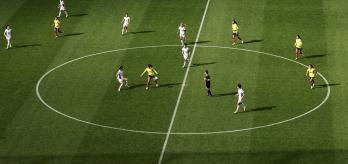Team dashboards
HOW SPAIN ATTACK – WIDE AREAS AND TRIANGLES
Spain are a very technical and tactical team when they have the ball. Neat, intricate and creative passing sequences have characterised the way Spain build and progress their play so far. The first-time finalists excel at keeping possession of the ball under pressure and have the technical capacity to play out of tight spaces. They can also change the direction of their play quickly when recognising space is available elsewhere on the pitch.
Anna Signeul has attended some of Spain's matches and summarises their strengths in possession, "Spain demonstrate patience with the ball and work hard to create the space they want to play into. They will vary their game so they can build and play through the thirds, but they can also be direct. They know where the space is."
When we explore the data, Spain are ranked number one in the competition for pass completion rate and line-break completion rate. They rank second and third for build-up in the middle and attacking thirds of the pitch respectively, and have spent more time than any other team in the attacking third when in possession.
Former New Zealand international Kirsty Yallop explains their game in wide areas is another of La Roja's key strengths in possession. "Spain like to attack from wide areas where they create triangles with three players. They activate great combinations in these areas to get players in behind their opposition's defensive lines. Their full-backs are very proactive in getting forward to overlap/underlap and they play clever push passes in between opposition defenders. They are also very good at crossing the ball and have scored two goals directly from crosses so far."
HOW SPAIN DEFENDS – HIGH PRESSING & COUNTER-PRESSING
When Spain are without the ball, they have been clear in their intentions to win it back as high up the pitch as possible. Their 5.2% of time spent out of possession in a high press is currently more than any other team. They are also the top-ranked team for the average duration of the pressure applied.
Spain's amount of time spent out of possession in the counter-press phase ranks third longest of the tournament. Importantly, they are succesful in winning back the ball during these periods; this is highlighted by them scoring third highest for physical duels won per 30 minutes.
Spain have also demonstrated defensive versatility by using mid-blocks when they recognise a cohesive press is not possible. However, when the opportunity for an effective press arises, they do it collectively and with physicality.
According to Yallop, "The way Spain get numbers around the ball quickly is very impressive. They always seem to get three players close to the ball after they lose it. When they are attacking in the final third, their rest defence is high with the positioning of their full-backs and defensive midfielder particularly relevant as they often pick up loose balls after the opposition defence tries to clear their lines, so they are set up to defend high, even when they are still attacking."
KEY PLAYER – Salma Paralluelo
Despite being only 19 years old, Spain's Salma Paralluelo (18) has made a real impact with her performances off the bench. Paralluelo won the FIFA U-20 Women's World Cup 2022™ in Costa Rica and scored three goals in the process. Although some players struggle during the transition from junior to senior football, the 19 year old has shown she can thrive at football's most elite level and light up matches with her athletic and technical prowess.
According to Yallop, "She's had an incredible impact off the bench in the knockout stages because she offers Spain something different. She can play anywhere across the front three and is technically excellent off both feet, scoring versus Sweden off her right foot and against Netherlands with her left.
"She stretches defences and gives Spain options to get in behind. She is quick, strong, agile and has great 1v1 ability. You just can't predict what she will do which makes her a nightmare to defend against. For such a young player to produce big moments for her team and with confidence in pressure situations is really impressive. She ignites the crowd!"
GOALKEEPER SPOTLIGHT - CATA COLL
Incredibly, Spain goalkeeper Cata Coll (23) made her senior-team debut for Spain in their round of 16 victory over Switzerland. Since then, she has played every minute. Her composure and technical ability to play out from the back with one or two touches has impressed the TSG. Coll is comfortable defending the space behind her defensive line and is strong when claiming high balls.
In the clip sequences below, Pascal Zuberbühler explains some of her key goalkeeping attributes that stand out in these game situations.
Playing out with her feet
"As we see in Clip 8, her confidence and game awareness with the ball at her feet is impressive. When the ball comes back to her, she recognises that her two nearest defenders are not options because of the pressure from the Sweden forwards. She is composed as she chops the ball back inside to deceive her opponent and opens new passing options. She plays through the first line of Sweden's defence to her defensive midfielder and starts an attacking move," explains Zuberbühler.
"In Clip 9, we see how high she is when her team is attacking in the final third. She is 38 metres from her goal line, and 35 metres from her defensive line. As her team needs to recycle the ball, she is there as an extra player to receive the ball and switch the play. You can see her team-mates have confidence in playing to her, even when she is under pressure," he added.
Defending the space behind her defensive line
"Clip 10 against Sweden is a great example of how she is playing close to her defensive line. She is 25 metres from them when the ball is played through and immediately she recognises she must defend the zone [the space between herself and her defensive line]. Her reaction is brilliant, and she makes a very important intervention, but this is all about her starting position. If she is even 2 metres further back, she will not get there and would be in a very dangerous 1v1 situation," says Zuberbühler.
"In the eleventh clip, we see her defensive line is high and even though she comes from inside her penalty area, and is under pressure, she completes a first-time pass forward to her teammate. She can see the striker is ahead of her defender and makes a great decision to come out and defend the zone," he explained.
Dealing with high balls
"In Clip 12 we see how she starts in a very good position for a defending corner against Sweden. Even though her goal area is very crowded, her footwork and how she works herself backwards to get the touch on the ball is impressive. She reads the situation the whole way and times her jump and intervention very well," Zuberbühler explains.
"In Clip 13 her positioning is exceptional as she deals with a difficult, aerial, cutback cross. She starts in the first post area but not too close to it so that when the ball is played, she takes a vital little first step that allows her to push off her right leg and make contact with the ball. Her timing and positioning are crucial in this situation," he adds.
The FIFA Women's World Cup 2023™ final between Spain and England takes place on Sunday, 20th August at Stadium Australia in Sydney with a 20:00 kick-off (local time).

















